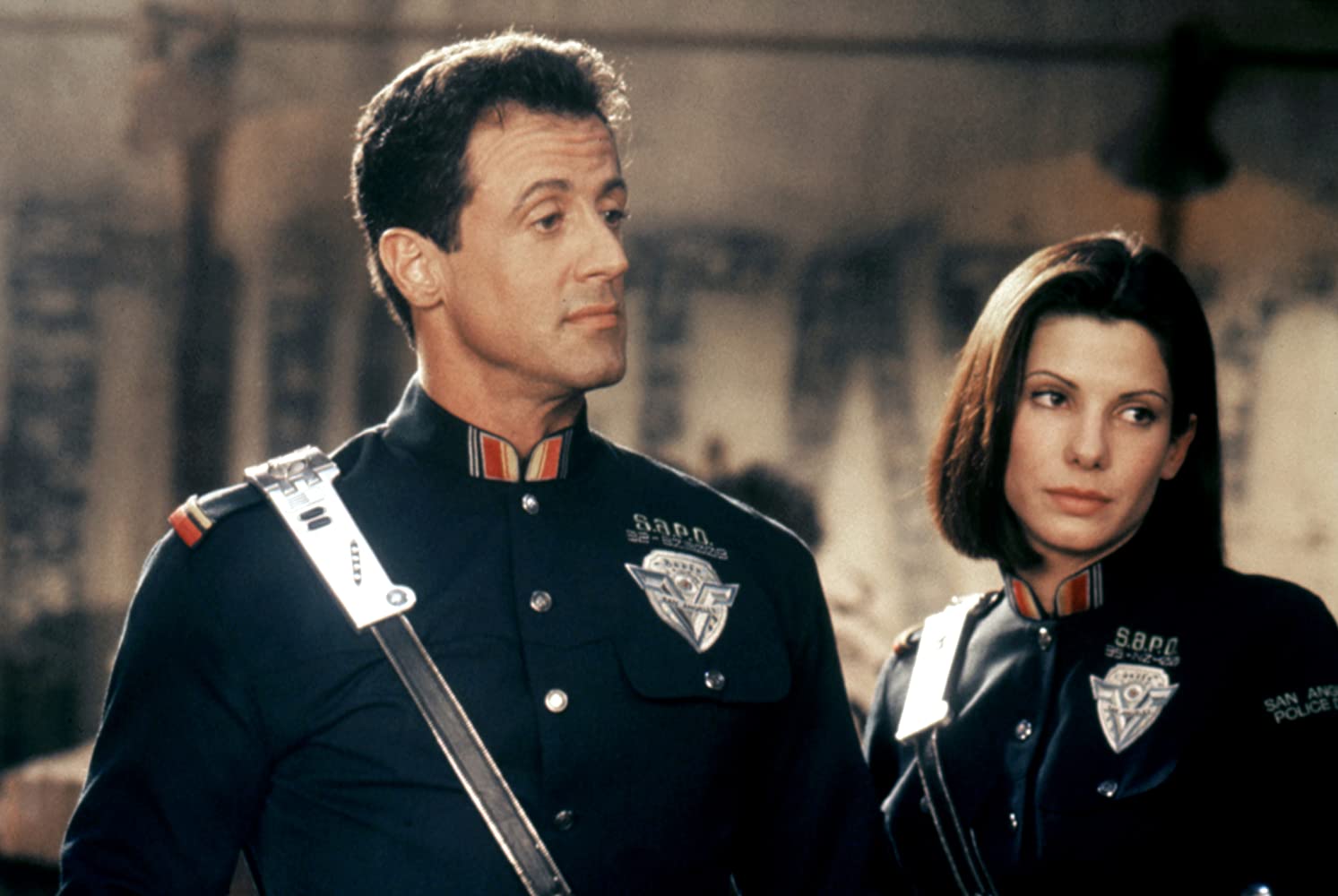Benevolent fascism? I dunno who exactly came up with this dystopia, but I cannot chide it for lack of uniqueness. See, it’s a police state where even thoughtcrime is penalized, yet at the same time, it’s so far removed from violence that the police don’t carry weapons and don’t know how to use force. I know, I know. Let that one sink in while we’re all protesting on behalf of BLM.
Most of Demolition Man takes place in “San Angeles” of 2032, but it starts in the at-the-time-slightly-future-present (1996) so we can have some bleak to be oblique about. Somewhere in war zone Los Angeles, madman Simon Phoenix (Wesley Snipes) has taken busload of hostages, and rogue cop John “Demolition Man” Spartan, a particularly destructive and ruthless force of law and order at all costs, has vowed to bring Phoenix down and save the passengers regardless of orders. Ah, the legacy of Dirty Harry. You should know that taking a city bus in Los Angeles in the 1990s was tantamount to accepting your fate; El Lay had like eight Speeds a week in those days … so on the one hand it’s hard to get too worked up when we find all the passengers have died.
Spartan catches Phoenix, but gets blamed for the deaths, and both get sent to cryo-freeze solid cube prison as punishment. Next scene, we’re in 2032 where all is sunny and bright, the people are docile and friendly, no one is allowed to smoke, drink, or swear and the radios all play innocuous commercial jingles. You know, Utah. On his way to parole rejection, Phoenix rises from his manacles and starts killin’ a bunch o’ folks. And, uh oh, the po po dunno what to do do. And then young Sandra Bullock gets a great idea of reviving the guy who caught Phoenix in the first place. Well, this plan can’t miss, huh?
A great deal of Demolition Man is devoted to John Spartan (Sylvester Stallone) adjusting to 2032. And it takes a lot of adjusting. This is an incredibly rich and antiseptic vision of the future. The “Great Earthquake” of 2010 apparently swallowed up anybody who’s got a pair. Hence, now guns can only be found in museums, and nobody wants one at that. The entire civilization resembles one great big business park: manicured lawns, trashless streets, and a ridiculous amount of smiles. Also, while Spartan was frozen, he was given hypnotic therapy and semi-productive skill sets. Rambo here can now knit an entire sweater overnight. I swear, that by itself would make me watch this film.
While English-challenged Rocky tries to figure out how to use the future can, his newfound peers don’t seem to be as pleasant as first suggested, often referring to Spartan as “Caveman” or “Neanderthal.” Man, you guys are awful snooty for people who find the word “damn” threatening. Eventually we get to the heavy stuff … Spartan v Phoenix II, a showdown in a vacuum-sealed, color-free future, the thrilla in vanilla if you will. This mano a mano comes with a whole lotta social commentary, which seems odd considering how little this particular slice o’ life resembles any civilization outside the original “Star Trek.”
The role of Simon Phoenix might be Wesley Snipes best work. After Alan Rickman redefined movie villains for Die Hard, the action films of the era were particularly advanced in the portrayal of the antagonist. It wasn’t really good enough at the time to hold a fluffy pet cat and calmly threaten James Bond with a laser. Snipes owned the blonde-fro’ed Phoenix, and when he did he was about as big as any black actor in Hollywood, which is a sad commentary from several perspectives. Contrarily, I think we mistook Stallone’s standard bland gorilla as refreshing by contrast. This role allowed he and wacky Rob Schneider to reconvene in Judge Dredd, where Stallone’s future cop routine made for one of the worst pictures of 1995.
Demolition Man is, in its way, a typical representative of an era which included Total Recall and The Fifth Element, and in other ways completely a-typical. We’re shown a brutal 90s cop in 2032 and asked to root for him to be brutal even though everything in 2032 looks better than everything in 1996. Is the film saying “fascism is fascism even when it comes with a smile?” Is the film saying “we were all better off when we had vices and squalor?” or “Should we be happy for ends-justify-the-means police lawlessness?” I don’t think the film is really saying either of these things, it settles on a shrug of “fascism is fascism even when it comes with a smile.” And this is perhaps where Demolition Man fails, accepting a violent showdown for a conclusion despite suggesting a societal reform. i.e. a film about a society becomes entirely about the players. It’s hard not to appreciate Demolition Man on several levels, but like Total Recall and The Fifth Element, a potential thought piece is drowned out by the gunfire.
That 90s cop whom all did denounce
Has come back to settle accounts
Forget what you saw
This man is the law
Be more convincing when he learns to pronounce
Rated R, 115 Minutes
Director: Marco Brambilla
Writer: Daniel Waters and Robert Reneau and Peter M. Lenkov
Genre: Our screwed future
Type of being most likely to enjoy this film: Those with healthy imaginations
Type of being least likely to enjoy this film: Any of forty different groups who imagine this film is castigating them




